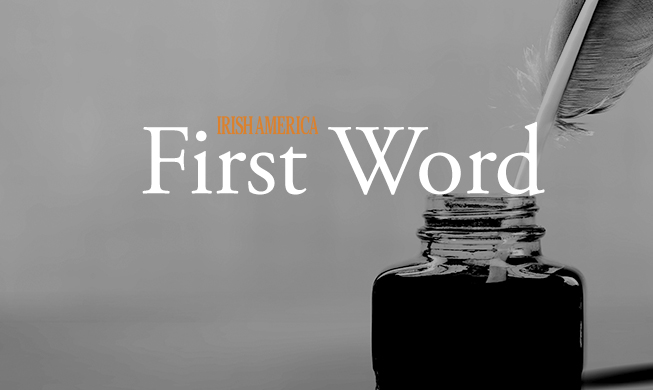
This has been quite a year (we measure time from March to March) for the Irish in America. As our annual Top 100 list shows, the Irish, as the song goes, are “top of the heap, king of the hill,” and not just in New York, New York, but everywhere.
But of all the great Irish American success stories there is none to rival Frank McCourt’s tale of triumph. As we go to press, his memoir Angela’s Ashes sits atop the New York Times best-seller list with sales of over two million hardcover copies. A star on four continents, he has received numerous literary awards including the Pulitzer Prize.
And so `tis that we honor Frank McCourt as our Irish American of the year 1998. He touched so many hearts, first as a teacher in New York public schools where he encouraged his students to “write what you know.” When he finally took his own advice and wrote his own story it was a classic, and buckets of tears were cried all across America and Ireland and England and Australia and Germany and Spain and wherever it was read. And we laughed too at times when it wasn’t funny because of his ironic wit, and because being Irish we know that when you have nothing else, a sense of humor is a powerful survival tool.
Frank’s story of overcoming the odds by doing the best he could, and finding opportunity wherever he could find it, and never giving up until he took home the prize, mirrors the larger story of the Irish in America. Especially those immigrants of the Depression and Famine era who arrived here with little more than dreams of a better life, and whose tenacity provided the impetus for future generations to succeed so that today we can compile a list such as our Top 100 to rival the best and the brightest of any ethnic group.
As we look back over the last year we see that Rosie O’Donnell reached new heights of fame as America’s favorite talk show host. Coach Mike Shanahan’s team the Denver Broncos won the Super Bowl. A monument to the Irish Brigade was erected on the site of the Antietam Battlefield thanks to the dedication of Jack O’Brien. Carol M. Browner developed and implemented new EPA policies. Chuck Feeney gave away his money and made a rare appearance at our Business 100 lunch in November, and Maureen Dowd, who keeps her satirical pen well sharpened, wrote about it in the New York Times. Roma Downey remained the number one angel on television. Irish Americans such as Bill Flynn held fast to the peace process in times of duress. Dancing genius Michael Flatley did for Irish dance what Frank McCourt did for literature, and made Barbara Walters’ list of most fascinating people. Gregory Peck gave us one of his rare interviews and received great press coverage for his one man show. And track star Aimee Mullins showed us that the winner is within.
And so the list goes on, stars all, and a very visible presence of Irish American clout.
Not so long ago (1981), Daniel Patrick Moynihan, the senior senator from New York, wrote, “Irish Americans are fast becoming an invisible ethnic group, not because they are quieter or fewer in number these days, but because they have met with extraordinary success here.”
Well, the old Irish American neighborhoods of New York and Chicago may indeed be disappearing, but as this
This has been quite a year (we measure time from March to March) for the Irish in America. As our annual Top 100 list shows, the Irish, as the song goes, are “top of the heap, king of the hill,” and not just in New York, New York, but everywhere.
But of all the great Irish American success stories there is none to rival Frank McCourt’s tale of triumph. As we go to press, his memoir Angela’s Ashes sits atop the New York Times best-seller list with sales of over two million hardcover copies. A star on four continents, he has received numerous literary awards including the Pulitzer Prize.
And so `tis that we honor Frank McCourt as our Irish American of the year 1998. He touched so many hearts, first as a teacher in New York public schools where he encouraged his students to “write what you know.” When he finally took his own advice and wrote his own story it was a classic, and buckets of tears were cried all across America and Ireland and England and Australia and Germany and Spain and wherever it was read. And we laughed too at times when it wasn’t funny because of his ironic wit, and because being Irish we know that when you have nothing else, a sense of humor is a powerful survival tool.
Frank’s story of overcoming the odds by doing the best he could, and finding opportunity wherever he could find it, and never giving up until he took home the prize, mirrors the larger story of the Irish in America. Especially those immigrants of the Depression and Famine era who arrived here with little more than dreams of a better life, and whose tenacity provided the impetus for future generations to succeed so that today we can compile a list such as our Top 100 to rival the best and the brightest of any ethnic group.
As we look back over the last year we see that Rosie O’Donnell reached new heights of fame as America’s favorite talk show host. Coach Mike Shanahan’s team the Denver Broncos won the Super Bowl. A monument to the Irish Brigade was erected on the site of the Antietam Battlefield thanks to the dedication of Jack O’Brien. Carol M. Browner developed and implemented new EPA policies. Chuck Feeney gave away his money and made a rare appearance at our Business 100 lunch in November, and Maureen Dowd, who keeps her satirical pen well sharpened, wrote about it in the New York Times. Roma Downey remained the number one angel on television. Irish Americans such as Bill Flynn held fast to the peace process in times of duress. Dancing genius Michael Flatley did for Irish dance what Frank McCourt did for literature, and made Barbara Walters’ list of most fascinating people. Gregory Peck gave us one of his rare interviews and received great press coverage for his one man show. And track star Aimee Mullins showed us that the winner is within.
And so the list goes on, stars all, and a very visible presence of Irish American clout.
Not so long ago (1981), Daniel Patrick Moynihan, the senior senator from New York, wrote, “Irish Americans are fast becoming an invisible ethnic group, not because they are quieter or fewer in number these days, but because they have met with extraordinary success here.”
Well, the old Irish American neighborhoods of New York and Chicago may indeed be disappearing, but as this list proves, the Irish didn’t go undergound. In 1998 an unprecedented number of Irish Americans are searching for their “roots.” And success has not caused the ties to grow weaker but to grow stronger, as evidenced by those on our list who have made very real contributions to furthering the peace process and growing Ireland’s economy, and contributing in other ways.
It is also good to note the number of our one hundred who are in the business of caregiving, such as Sister Teresa Fitzgerald who looks out for the children of mothers in prison. Maybe there’s some historic memory of poorer times that causes these Irish Americans to give so much of themselves.
All in all, we hope that you will find plenty to be proud of as you read all of the Top 100 profiles as written by Darina Molloy and Sarah Buscher.
“Isn’t this a great country altogether,” a character in Frank’s book remarks at the very end. And indeed, America, which as a country creates an atmosphere in which one can aspire to great things and sometimes attain them, has been a grand country for the Irish.
Happy St. Patrick’s Day. Mortas Cine.
Editor’s Note: This article was originally published in the March / April 1998 issue of Irish America. ⬥


Leave a Reply